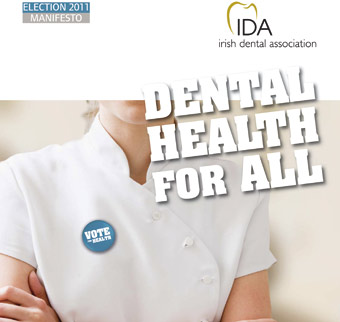IDA launches election manifesto
The IDA reveals what it expects from the new government in its Dental Health Manifesto
The Irish Dental Association (IDA) has revealed what it expects from the new government in its Election 2011 Dental Health Manifesto.
The association says that recent cutbacks in dental health services are having a devastating impact on patients and will end up costing the state more in the long run. The IDA manifesto highlights what it describes as the four “crisis issues in dental health care in Ireland” and pinpoints the action it wants to see from the incoming government.
The first crisis issue is the stopping of all treatment – except the annual oral examination – under the PRSI dental scheme. The IDA says that, according to figures from the Central Statistics Office, the cost to patients has risen by 14 per cent solely because of the government’s decision. It says patients who can’t afford private treatment are foregoing or delaying seeing a dentist, exacerbating any dental problems they have. The association is calling for key treatments to be restored, particularly restorative treatments such as periodontal treatments, cleanings and fillings.
The second issue is the restriction under the medical card dental scheme to emergency dental care, with additional care to be considered only in high-risk or exceptional cases. The IDA is calling on the HSE to prioritise additional funding to cope with the rise in medical card holders and to negotiate a new contract with the IDA that prioritises preventive treatment.
In the document the association also calls for the Public Dental Service to be exempt from the HSE’s moratorium on recruitment in order to address what it sees as critical vacancies. The IDA says these vacancies have led to the closure of clinics, non-screening of children and long delays for patients requiring dental treatment.
Finally, the IDA points out that the absence of a Chief Dental Officer means there has been no dental advisor in the department of health for almost a decade, with no new oral health policy since 1994.
This, the association asserts, has had a detrimental effect on the development of an oral health policy, with many unsuitable and ad hoc arrangements being introduced instead.
